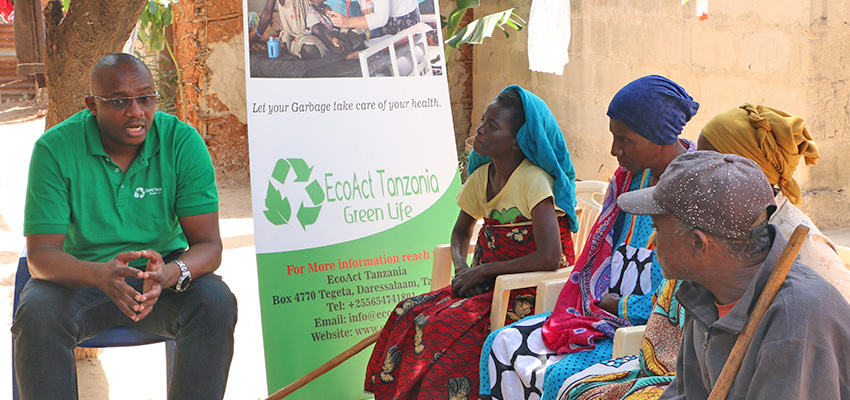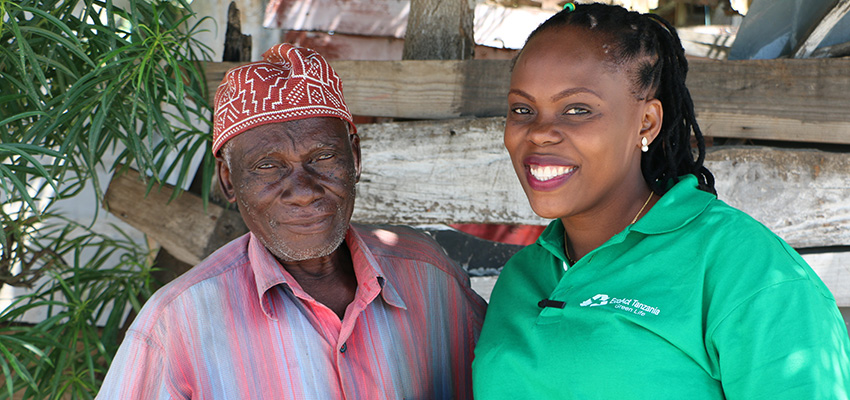
This past summer I had the opportunity to work with EcoAct as an MIT D-Lab Monitoring and Evaluation (M&E) Fellow. It was a great opportunity to contribute to the first impact measurement framework of a social startup.
EcoAct, a 2019 D-Lab Scale-Up Fellow venture, is an early-stage start-up founded by Christian Mwijage in Dar es Salaam, Tanzania. EcoAct strives to reduce deforestation and plastic pollution through recycled plastic construction materials. They have collection points where they buy plastic from waste pickers and then transport the plastic to their factory. At the factory, the plastic is sorted, crushed and transformed into recycled plastic timbers. These plastic timbers can be used as fencing, decking, and other structures. EcoAct has the plan of expanding its products to other construction materials in the following years. As part of its business plan and incentive structure, EcoAct also provides health micro-insurance to the waste collectors and their families.
EcoAct had two specific monitoring and evaluation needs: the first was to measure and track EcoAct’s overall impact, and the second was to conduct a needs assessment and baseline survey for their micro-insurance program.
How to Measure and Track EcoAct’s Impact
My first days at EcoAct were dedicated to understanding the business model and doing a literature review to learn about waste management and deforestation in Tanzania. Once I had a better understanding of the company, I could start designing the impact measurement framework. I started by working on the theory of change.
What is a theory of change? It is a methodology used by companies, NGOs and other organizations with a social goal. The theory of change illustrates how the desired change will happen by converting the organization’s intervention into impacts. It answers the following questions: Who is the organization trying to influence? What does the organization hope it will do? How will that change the world? The theory of change we defined for EcoAct was the following:
“If EcoAct collects plastic garbage in exchange for health microinsurance, and then transforms this waste into recycled plastic timbers (RPTs), then waste pickers will provide this plastic and businesses, government and individuals will purchase the RPTs and reduce their wood consumption. This will result in a reduction of plastic pollution, deforestation, and improved health insurance access”.
After we had defined the theory of change, we created a log frame (logical framework). Log frames are mainly used to design, monitor and evaluate projects or organizations. The log frame structures the elements of the theory of change (inputs, outputs, outcomes, and impact), and for each, it specifies the key indicators, how they will be verified and the important assumptions to consider. For EcoAct it was important to develop a log frame to determine the key variables to measure and when those metrics would be collected.
Once the theory of change and log frame were defined, we needed to make sure there was knowledge within the organization on how to track the metrics, store them and to share them across the team. It was of great importance to make sure all data was stored digitally. In order to ensure digitalization, we created tools to track some of those missing outputs, such as an inventory tracker, we trained staff on how to use the tools.
The overall result was an impact scorecard for EcoAct. The impact scorecard measures, tracks, and displays monthly progress on a variety of impact metrics: kg of plastic collected, tons of CO2 mitigated, tons of timber saved, kg of plastic upcycled, hectares of forest saved, and health insurance beneficiaries.
Micro-insurance program – Conducting a needs assessment and baseline survey
EcoAct’s second M&E need was related to its micro-insurance program. The program has the objective of providing health insurance to low-income households in exchange for their plastic garbage. EcoAct ran a pilot one year prior to my summer internship, but little to no information was collected and there were few insights about the implementation. Now, EcoAct had the goal of launching another pilot with 100 families, this time using data to improve the design of the program. To start, they wanted to collect baseline information to measure the impact of the program in the following months.

First, we had to understand the program objectives and the logistics of how the pilot would work; to do this, we analyzed the alternative of partnering with a private insurance company or with the government insurance program.
Once the program objectives and logistics were defined, we developed a baseline and diagnosis survey that included questions from the Poverty Probability Index, questions regarding the medical needs of families, and questions regarding how much families had spent on health over a specific period of time. The survey was then translated to Swahili and sent for approval to government officials prior to collecting data.
The most exciting part of the process was the data collection step since it meant talking face to face to potential beneficiaries of the program. We successfully collected this data thanks to the great enumerators from EcoAct’s team and the assistance from government officials who helped identify respondents. Within two days, we managed to survey around 70 families, hearing their stories and their needs.
Once we had collected the data, I analyzed the data and gave a presentation to EcoAct’s top management team with the findings about the survey. These results will now be used by EcoAct to create a program that addresses the challenges many families face regarding health insurance access and affordability, and the information will also be used as baseline data to track the impact of the program.
Overall, my experience of being an M&E fellow for a social enterprise was great. I enjoyed seeing the hard work and passion of EcoAct’s team and learning how an early-stage social enterprise can set up processes and tools to track its future impact.
About the writer
Iris Lau-Castro was a Monitoring and Evaluation fellow at MIT D-Lab in the summer of 2019. She is currently pursuing an MPA in Development Practice at Columbia University. Iris has worked as a financial consultant for social enterprises, with special focus on the process of raising capital. She also has experience as a financial analyst for the private sector.

